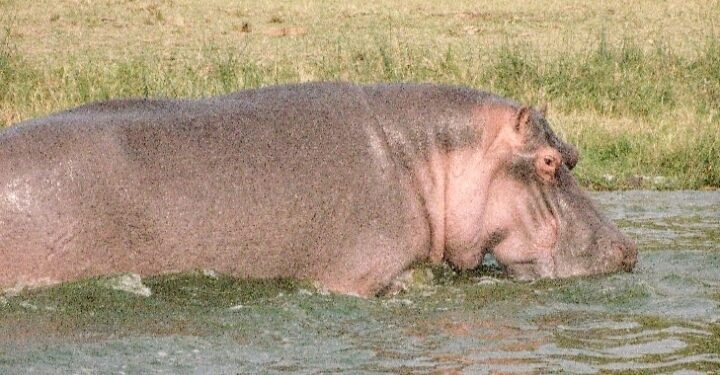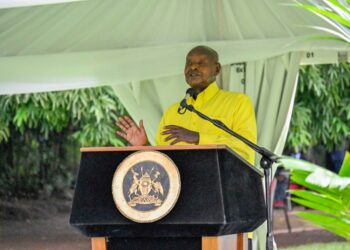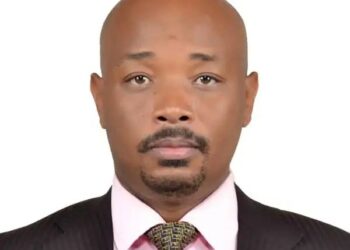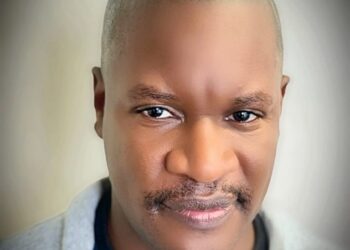One of the elders in Bunyaruguru told me this story, of ridicule that enlists laughter. That once (as if they stopped), a Muhima was travelling through Bunyaruguru from Busongora to Nyabushozi. As he rose from Bwera (the park) at Nyamuhuru ascending to the Kyambura escarpments, akwatwa ekishonga (a pneumonic pain) in the left side.
He lay by the side of the path, and it was getting dark. Hyenas were howling in the distance and anytime, he would be sauce for the wild animals. Then a Munyaruguru muhiigi (hunter) came by and found an exhausted human being lying by the side.
With his mugeto (hunt) on the shoulders, he carried the dying man on his back. When he reached Omukayooro, his wife was Kumukyamiriza (waiting to unburden him and give him some food) before reaching their home in Kyambuzi- Balyanika. The wife was surprised to see the husband carrying meat and a man.
Her husband shared the porridge and the food the wife had brought him with the dying man. The wife carried the meat, and the husband carried the dying man. The man who for this story we shall call Kasana, called his mother “Nyinandyoka” to treat the kishonga of the dying man.
Nyinandyoka mixed herbs and treated the man who we shall call Kahima. He was fed on the game broth. After three days, Kahima was well and was good to go. They gave him enough ntanda (victuals) to enable him to reach his home. Kasana even showed him a shorter and safer route through Buhweju. When Kasana turned to go, Kahima held him by the hand, gave him a firm embrace and told him; “Ku harahweho eirimansi ibiri, oije owaitu Kanoni na Muk’abaawe nkukunire kandi nkurongore” Meaning, after two weeks, come with your wife, I will show you gratitude and gift you”

Two weeks later, Kasana went with his wife to Kanoni in Nyabushozi. True to his word, Kahima invited friends and relatives and a feast was held in Kasana’s honour; the man who saved him. After the feast, Kahima led Kasana to the kraal and pointed to him a dark brown cow (kaasha) with a white spot at the centre of its forehead as his gift. To which, Kasana was grateful. He touched and stroked its magnificent horns and it grunted in acceptance. And then, it passed dung.
However, tradition of ‘kuhaana’, giving each other gifts dictates that you do not take the cow or goat given to you that same day. You come another day for the purpose of kufunya (drive-away) your cow or goat, and it was mostly in the early mornings.
A week later, Kasana came back to fetch his mpaano (gift). He stayed for a night and was to drive away with his cow early in the morning. But his ‘friend’ had been advised that a Munyaruguru will not manage to look after the cow. And so, he should instead give him a huge Mushere “brown” goat.
In the morning, Kahima presented Kasana with the huge dark brown goat and was told that, for the week he was away, his mpaano fell terribly sick. However, it cannot change to another since this is what had been given to him”. Kasana looked at it at once and recognized this is not what was shown to him a week ago. This was a goat. However, being in a foreign land, he accepted the ‘mpaano’ and tied a rope around the goat’s neck and drove it away.
As the sun reached the centre of the sky, past the hills of Buhweju, the goat bleated. And Kasana commented; “Nkasiga nozuga moooow ati nozuga meeeee! Weza okarwara Amooti we. “You cow, I left when you gave out the sound of Mooooow and now you sound like Meeeeeee? Indeed you fell sick” A few steps later, the goat pooped its goat pebble like poo.
Kasana commented again; “Weeza okarwara wa! Nkasiga nonia batabata ati nonia wuruwuru?” to mean, indeed you fell sick. I left when you pooped heavy mounds of dung and now you pass out goat pebbles?” The goat was getting agitated, and it tried to knock him and he held its tiny horns and commented;
“Nimazima okarwara Amooti we. Kawarwere n’amayembe gakeeya? Leka nkutwale nkulegye ebica oleke kubwanabwana.” Meaning; ‘Indeed you fell sick my dear cow. When you fell sick, even your magnificent long horns reduced in size? Let me take you and I slaughter you and I save you from the suffering.
When Kasana reached home at twilight, he invited his wife to come and see the cow that Kahima gave them. When she came out of the kitchen, she beat the sides of her thighs and held her hands on the head and cried out; “Maawe nyamasoka! Embuzi ekaba lyali ente?” Meaning; “Thighs my mother! When did a goat become a cow?”
Kasana did not say anything. And his mother, Nyamungwe also came out of her hut to see the cow that turned into a goat and she exclaimed; “Amagezi g’Omuyima kagaraabe gamugira ngu osemeriire embuzi… tindamutambiire ngu ampe ente. Baana mwe! Muyoole omuyo mugiregye omusaayo. Besi Omunyaruguru atungwa ente nainga atungwa akahanga k’ewe?” Meaning; ”In his wisdom, if he thought you are worth a goat….I didn’t treat his pneumonia to give me a cow. Children! (Commanding her grandsons), sharpen a knife and slaughter the damn goat. A Munyaruguru does not live by the cows but by his brains. Such stories are ended at the Munyaruguru talking to the goat and not at the point when Nyamungwe speaks. The intention to ridicule these indigenous communities and assert that they are nothing but imbeciles.
Do you have a story in your community or an opinion to share with us: Email us at editorial@watchdoguganda.com













